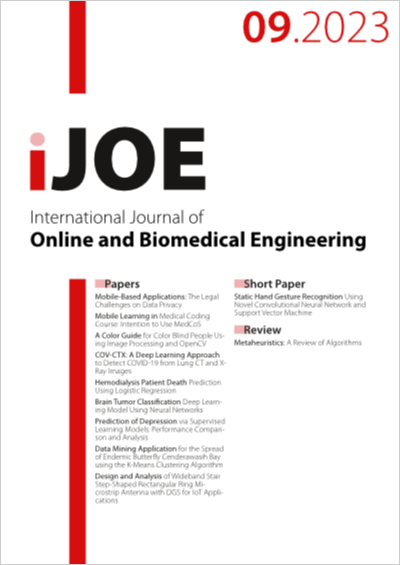Prediction of Depression via Supervised Learning Models: Performance Comparison and Analysis
DOI:
https://doi.org/10.3991/ijoe.v19i09.39823Keywords:
Machine learning, K-NN, DT, SVM, NB, LR , DepressionAbstract
This document Among all the various types of mental and psychosocial illnesses, the most commonly occurring type is depression. It can cause serious problems such as suicide. Therefore, early detection is important to stop the progression of this disease that could endanger human lives. Predicting and detecting early-stage depression using machine learning (ML) techniques is a promising strategy. This study’s main purpose is to assess which ML techniques are highly appropriate and accurate regarding such diagnoses. Six supervised ML techniques namely: K-nearest neighbor (KNN), Random Forest (RF), Logistic Regression (LR), Decision Tree (DT), Support vector machine (SVM) and Naive Bayes (NB) were applied on dataset collected from Kaggle and compared for their accuracy (ACC) and performance in predicting depression. The performance of each model was evaluated using 10-fold cross-validation and evaluated in terms of ACC, F1-score, Precision (PR), and Sensitivity (SEN). Based on the experimental results analysis, we can conclude that SVM and LR performed better than all other methods with an ACC of 83,32%. Therefore, we found that a simple ML algorithm can be used to assist clinicians and practitioners predict depression at an early stage, with excellent potential utility and a considerable degree of ACC.
Downloads
Published
How to Cite
Issue
Section
License
Copyright (c) 2023 zineb Sabouri, Noreddine Gherabi, Mohammed Nasri, Mohamed Amnai, Hakim El Massari, Imane Moustati

This work is licensed under a Creative Commons Attribution 4.0 International License.



